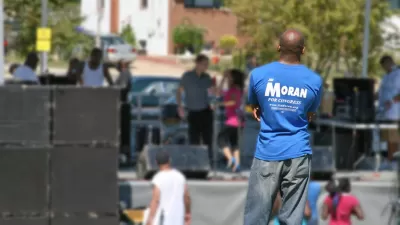Kids from Walt Whitman Middle School in Brooklyn wanted to know why there were so many empty lots around their school. The Center for Urban Pedagogy worked with the kids to understand why, and created a video document from what they found.
Nancy Levinson at PLACES explains:
"The students interview local landowners, city officials, an environmental consultant, an advocate for the homeless, and a high school administrator, among others, and learn some of the non-intuitive rules of urban real estate (e.g., why it's often more profitable to leave a lot vacant and trashy than to construct something useful and attractive). They take their video cameras to the streets, and read the fine print fine on the signage, noting that the lot owners are usually absentee suburbanites."
FULL STORY: The Good, the Bad, and the Empty

Maui's Vacation Rental Debate Turns Ugly
Verbal attacks, misinformation campaigns and fistfights plague a high-stakes debate to convert thousands of vacation rentals into long-term housing.

Planetizen Federal Action Tracker
A weekly monitor of how Trump’s orders and actions are impacting planners and planning in America.

San Francisco Suspends Traffic Calming Amidst Record Deaths
Citing “a challenging fiscal landscape,” the city will cease the program on the heels of 42 traffic deaths, including 24 pedestrians.

Defunct Pittsburgh Power Plant to Become Residential Tower
A decommissioned steam heat plant will be redeveloped into almost 100 affordable housing units.

Trump Prompts Restructuring of Transportation Research Board in “Unprecedented Overreach”
The TRB has eliminated more than half of its committees including those focused on climate, equity, and cities.

Amtrak Rolls Out New Orleans to Alabama “Mardi Gras” Train
The new service will operate morning and evening departures between Mobile and New Orleans.
Urban Design for Planners 1: Software Tools
This six-course series explores essential urban design concepts using open source software and equips planners with the tools they need to participate fully in the urban design process.
Planning for Universal Design
Learn the tools for implementing Universal Design in planning regulations.
Heyer Gruel & Associates PA
JM Goldson LLC
Custer County Colorado
City of Camden Redevelopment Agency
City of Astoria
Transportation Research & Education Center (TREC) at Portland State University
Jefferson Parish Government
Camden Redevelopment Agency
City of Claremont



























